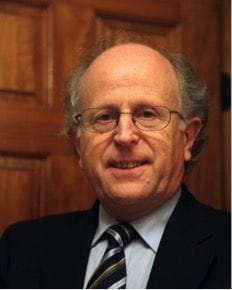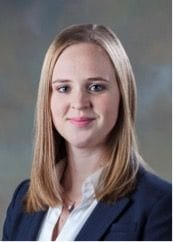The mentor/mentee relationship between Dr. Katherine Jungjohann and Professor C. Barry Carter, a consultant for the Center of Integrated Nanotechnologies (CINT), was arranged by others but evolved organically. Carter was a natural choice for Jungjohann, who wanted guidance after finishing her postdoc and beginning a staff scientist position at CINT. Carter never saw himself as […]

The mentor/mentee relationship between Dr. Katherine Jungjohann and Professor C. Barry Carter, a consultant for the Center of Integrated Nanotechnologies (CINT), was arranged by others but evolved organically. Carter was a natural choice for Jungjohann, who wanted guidance after finishing her postdoc and beginning a staff scientist position at CINT. Carter never saw himself as fulfilling a mentor role; he simply wanted to help people who asked.

“It was Barry who directed me to apply for the position at Sandia before we had even met in person,” Jungjohann said.
Carter was seeking an electron microscopist who could work on a team and interact with a diverse user community. Although Carter viewed Jungjohann as young for the position, he saw her character, confidence and expertise as the right recipe for success. Once begun, their mentor/mentee relationship grew from overlapping research interests into collaborations that strengthened user capabilities within electron microscopy instrumentation and techniques at CINT.
Question to Barry Carter: What is your history of mentorship?
“I didn’t receive help when I was younger,” says Carter.
The social climate in academia has changed since Carter was an assistant professor at Cornell in the early 1980s. At that time, the faculty thought they didn’t need mentorship because they were the top ranked Materials Science program in the country. Young academics needed to show independence to receive full credit for their research work, they felt. Instead, Carter found a mentor from another institution where there was no direct competition. Today, Carter’s suggestion to early career staff: “find a mentor.”

Question to Katherine Jungjohann: How have you benefited from having a mentor?
“I seek mentorship whenever I have a question I can’t answer and there is someone with the background and experience to consult.”
Jungjohann’s relationship with Carter proved beneficial not only for career opportunities, but also for continued learning. Working with her mentor, she was able to locate and consult a range of experts in her field. In addition to experimental collaborations, the pair recently produced a book chapter in the Transmission Electron Microscopy companion textbook.
Jungjohann comments, “What I find most inspirational about working with Carter is his ability to find value in experiments which, in my opinion, were complete failures. Carter’s positivity and passion for research have been a wonderful influence on me.”
Question to Barry Carter: What have you gained from mentoring Katherine Jungjohann?
This mentoring relationship has been a good link for new experimental capabilities forged through this collaboration.
“Sandia National Laboratories and CINT is where I do all of my research,” said Carter.
Question to Katherine Jungjohann: What are some experiences that have led you to seek mentorship?
“I have found professional mentorship helpful in circumstances where I felt inexperienced or when in a situation where something wasn’t right. An example is being granted proper credit for your work and ideas. I highly recommend any young professional to seek external advice and support if they are in a situation where they are being taken advantage of.”
Carter commented that it is disappointing that some people at the highest levels of science are still focused on themselves and are not actively mentoring the next generation of scientists to achieve the same level of success. His message was that some of the people at the highest positions may not make the best mentors, as their perspective may come from a focus on self-promotion.
For our community to grow and flourish, we need to all make an effort to seek advice when needed and to provide guidance and support to those whom request it.
Katherine Jungjohann is is a staff scientist at Sandia National Laboratory’s Center for Integrated Nanotechnologies. Her research focuses on liquid-phase TEM of nanomaterial growth, assembly, corrosion & electrochemistry. She is a member of the Nano LettersEarly Career Advisory Board.
